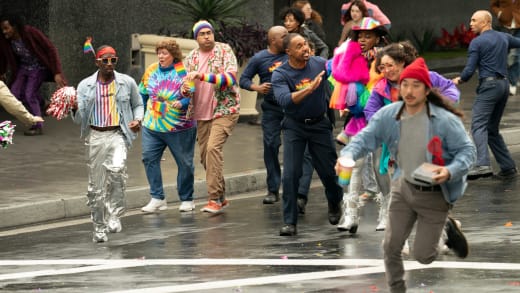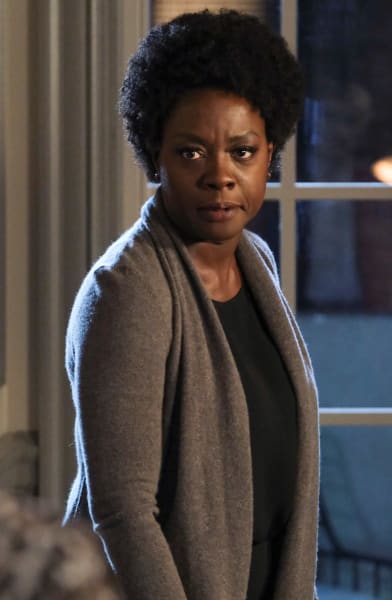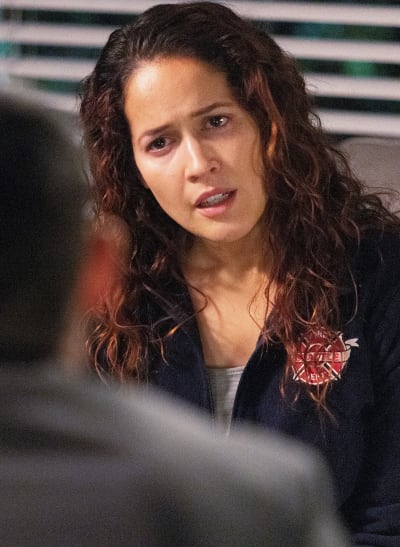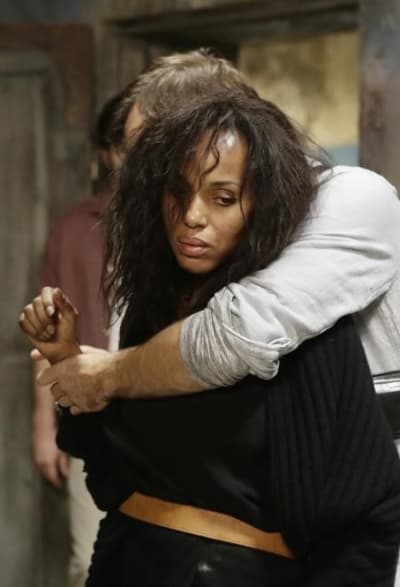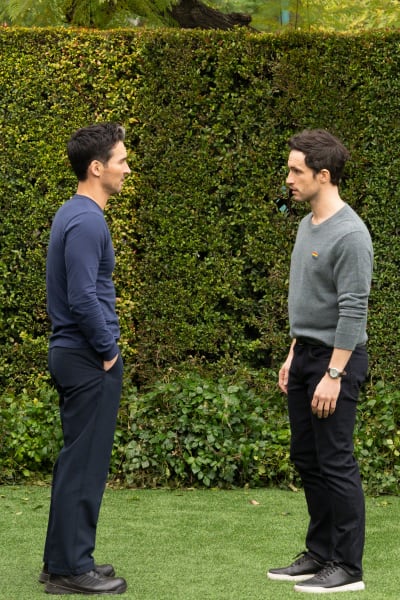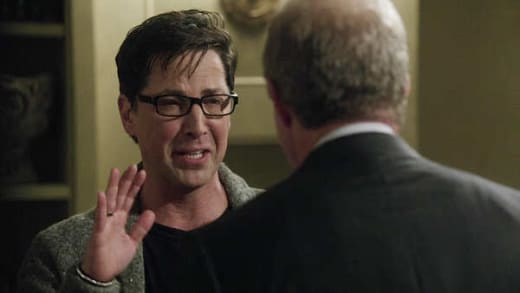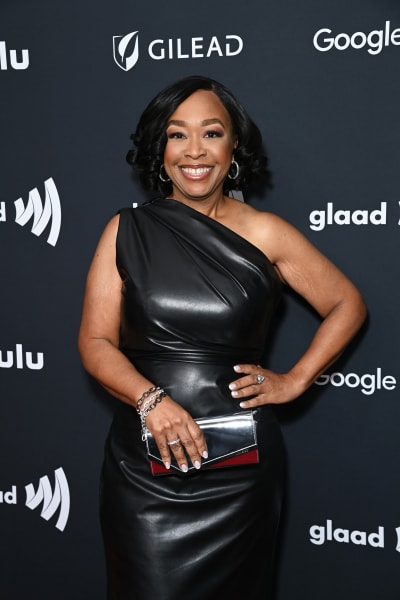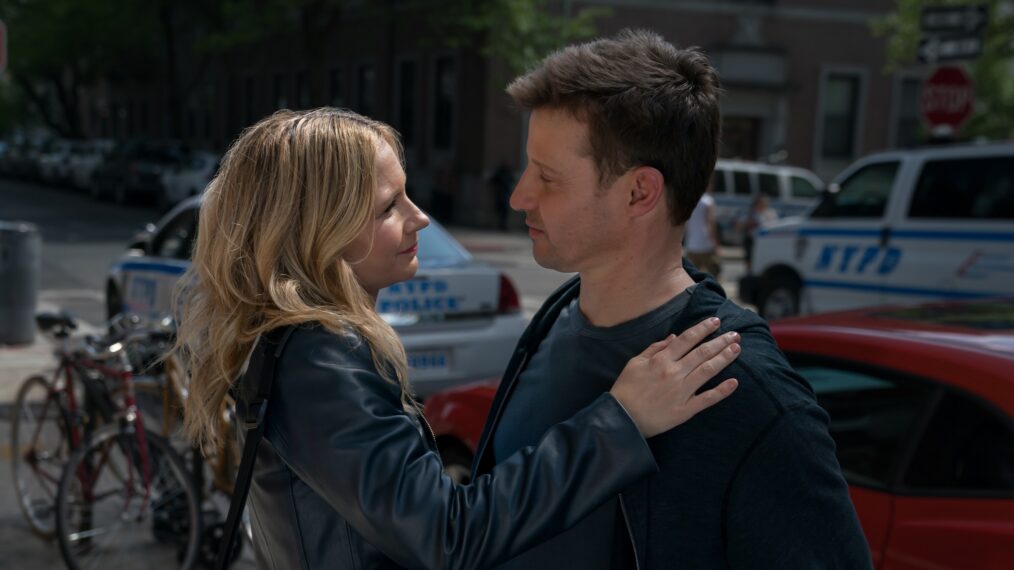Does Shondaland Target Vulnerable Communities for an Emotional Response?

Another week, another traumatic episode of a Shonda Rhimes show that centers around a vulnerable group.
On Station 19 Season 7 Episode 3, the firehouse fam attends a Pride parade to celebrate Seattle’s LGBTQ+ community. For a full recap and review, check out TV Fanatic Jasmine Blu’s expert take on True Colors!
During the Pride parade, a car backfires, the sound is mistaken for a gunshot, and chaos erupts. As painful as it is, this is an entirely predictable series of events because Shondaland loves to give marginalized communities a tragedy to rally around.
Don’t get us wrong. We love this universe. Everything Shonda Rhimes touches turns to gold.
But we’d be remiss if we ignored the fact that sometimes it’s hard to stomach some of the painful storylines vulnerable communities have to endure in the worlds she builds.
Looking back on the history of Shonda’s television empire, it’s clear that this isn’t a new phenomenon. LGBTQ+ people aren’t the only ones who tend to get shafted, either.
Throughout each of the series, Shonda and her team of writers have worked to integrate real-life issues into these shows. More often than not, vulnerable groups take the brunt of this effort. One that tends to suffer in Shondaland: women.
Sexual Assault in Shondaland
In Shonda Rhimes’ primetime television history, there’s never been a show that didn’t include some sort of sexual assault storyline for a female character. Let’s take a look at some examples:
How to Get Away With Murder Season 1 Episode 13 details a heartbreaking part of its main character’s past with the revelation that Annalise was sexually abused as a child.
On Scandal, the shocking news that Fitz’s father assaulted Mellie rocked the fandom.
Grey’s Anatomy has dealt with the issue of sexual assault more than once in its two-decade long run. Patients and doctors alike have been victimized.
Private Practice’s resident psychiatrist, Violet Turner, has a backstory that includes rape and a subsequent abortion. Charlotte is violently attacked on-screen, and more than one patient suffers in this way as well.
On Station 19 Season 5, Episode 15, Andy is assaulted outside a bar and forced to defend herself. She isn’t the only Station 19 character with this pain in her past.
What is the reason behind all of these incredible women being forced to endure such horrific violence? Is it an attempt to make them relatable to the millions of women who have been through similar events?
It sends a strange message, frankly. Can women be written as strong characters without having to overcome an assault?
Even when it doesn’t involve sexual violence, Shonda’s leading ladies get brutalized.
A patient physically beat Meredith. Olivia Pope was kidnapped and tortured. Jo Wilson escaped an abusive marriage. Violet Turner was attacked while pregnant and her baby kidnapped by a patient.
At a certain point, we have to wonder: is this treatment of women designed to provoke an emotional response from a predominantly female fan base?
Shonda’s Tragic LGBTQ+ Characters
Don’t worry; women aren’t suffering alone in Shondaland.
As if Station 19’s shooting-that-isn’t-really-a-shooting isn’t bad enough, Maya (one of two LGBTQ+ women on the show) has to deal with finding out her brother is a homophobe who joins a group of protesters in intimidating parade attendees.
Not for nothing; non-straight characters in Shonda’s universe take hits all the time.
As recently as Grey’s Anatomy Season 20 Episode 2, an LGBTQ+ patient receives an HIV diagnosis (in a pretty terrible way) and has to deal with the aftermath.
In 20 years of Grey’s Anatomy, the number of tragic (or just heartbreaking) endings for LGBTQ+ couples has added up to a staggering number.
Arizona Robbins and Callie Torres: divorced. Nico Kim and Levi Schmidt: broken up. Amelia Shepherd and Kai Bartley: broken up and separated by an ocean. Teddy Altman and Allison Robin Brown: separated by a tragic death.
And who can forget the very first gay kiss on Grey’s between patient Darren Covington and his clandestine lover, Todd (which would have been great if Darren hadn’t unceremoniously died shortly after that)?
Shonda’s shows sometimes play into the Bury Your Gays trope, with notable LGBTQ+ characters meeting tragic ends:
Annalise Keating (How to Get Away With Murder), James Novak (Scandal), Bizzy AND Susan (Private Practice), Travis’s husband, Michael (Station 19) — all dead.
Watching these shows — or even just the promos for episodes like Station 19‘s True Colors — can give the impression that there is a specific agenda and vulnerable groups are usually at the center.
Shondaland’s big hits have addressed everything from racism to sexism to ableism, and to be entirely fair, these topics are usually handled with grace. Most of the time, the issues come up on screen when they’re especially relevant in the real world.
Jack: I’m afraid to talk to anyone right now, not just you, to anyone. I’m afraid to talk to my best friend.
Diane: Miller.
Jack: I’m afraid I’m gonna get every word wrong or even one word. I know I’m not a racist…
Diane: Oh, you do realize ‘I’m not racist’ is kind of the club slogan of racists, and that’s because we live in a culture built on white supremacy. So the racism is baked in, and we can’t begin to undo it until we name it and own it.
Jack: OK, see this is exactly my point. I’m damned if I do and damned if I don’t. Cops take a knee, join the protests, they’re called hypocrites. And Dixon, he is a hypocrite. He is racist. But it can’t be that across the board?
Diane: You come to see me twice a month, so I have to assume that you like me, right? You like that I give you tough love and don’t pull punches, and you came in here today, looking for some clarity. So, here it is. I know what you mean when you say you aren’t racist, and I believe that you do not have the hatred in your heart, but you also aren’t damned, not even in the least bit. You’re blessed as hell. I know you grew up on the streets, and the system, and I’m not diminishing your hardship, but you are…
Jack: I’m privileged because I’m white, I get it.
From the perspective of an LGBTQ+ woman, it’s easy to say that sometimes it would be nice to escape the real world for an hour. But there’s a privilege in escapism, and perhaps spreading awareness of global issues is more important than getting a break from feeling marginalized.
Maybe Shonda Rhimes does target vulnerable groups, but her intentions are as much about making important statements on challenging issues as they are about getting views.
Far be it from us to tell Shonda how to do her job, but we’d love to see a gay couple get a happy ending or a woman rise to the top without having to be victimized first.
We’ll hold our breath.
In the meantime, we’ll keep watching Ms. Rhimes’ work and getting our hearts broken over and over again.
Haley Whitmire White is a staff writer for TV Fanatic. You can follow her on X.
Read the original article here

